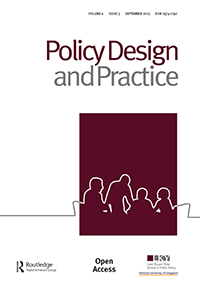Victory for all, administration for some: an examination of differences in the impact of Indigenous jurisdictional expansion in Oklahoma
IF 2.6
Q1 PUBLIC ADMINISTRATION
引用次数: 1
Abstract
Abstract Indigenous polities often face the consequences of decisions that emerge from processes outside of their control. The U.S. Supreme Court decision on McGirt v. Oklahoma in 2020, which recognized nearly a third of the state of Oklahoma as potentially within the jurisdiction of five Native American tribes, is one such example. The lawsuit generating this decision was a legal appeal by an individual – not a tribe – and may have implications that include recognizing tribal jurisdiction in civil and criminal matters throughout much of the state. The decision was celebrated by tribes and those advocating for greater recognition of their territorial authority. Yet, for tribal leaders and other practitioners of Indigenous self-determination, the decision potentially shifts major administrative burdens to resource-limited tribes. In an attempt to mitigate the significant costs of administering this territory, these tribes have initiated negotiations with the state of Oklahoma and local municipalities to clarify jurisdiction and coordinate administrative responsibilities. Outrage over these negotiations came from mostly academics and activists who perceived negotiations as a rejection of greater jurisdictional sovereignty. This paper uses the McGirt decision as a point of entry to explore differences in how practitioners and academics grounded in Indigenous politics understand the impact of policy shifts even when they further mutually desired commitments.所有人的胜利,一些人的管理:俄克拉荷马州土著管辖权扩张影响的差异研究
抽象的土著政治往往面临着来自其控制之外的过程的决策的后果。2020年,美国最高法院对McGirt诉俄克拉何马州一案的裁决就是这样一个例子,该裁决承认俄克拉何马州近三分之一的地区可能属于五个美洲原住民部落的管辖范围。产生这一决定的诉讼是个人而非部落的法律上诉,可能会产生影响,包括承认部落在该州大部分地区的民事和刑事事务中的管辖权。这一决定受到了部落和那些主张进一步承认其领土权威的人的赞扬。然而,对于部落领袖和其他土著自决从业者来说,这一决定可能会将主要的行政负担转移到资源有限的部落身上。为了减轻管理这片领土的巨大成本,这些部落已经开始与俄克拉荷马州和地方市政当局进行谈判,以澄清管辖权并协调行政责任。对这些谈判的愤怒主要来自学者和活动家,他们认为谈判是对更大管辖权主权的拒绝。本文以McGirt决定为切入点,探讨了以土著政治为基础的从业者和学者如何理解政策转变的影响,即使他们进一步达成了共同期望的承诺。
本文章由计算机程序翻译,如有差异,请以英文原文为准。
求助全文
约1分钟内获得全文
求助全文
来源期刊

Policy Design and Practice
PUBLIC ADMINISTRATION-
CiteScore
10.30
自引率
4.30%
发文量
19
审稿时长
13 weeks
期刊介绍:
 求助内容:
求助内容: 应助结果提醒方式:
应助结果提醒方式:


